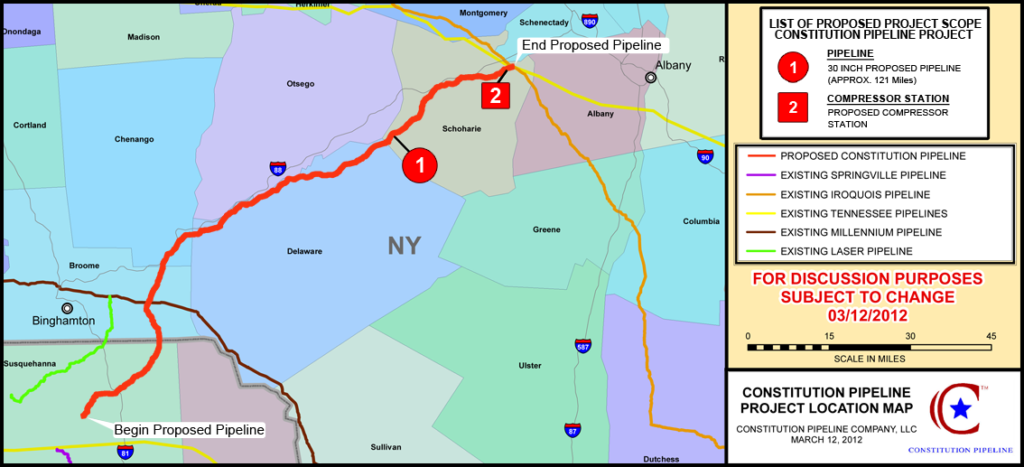NGI Archives | NGI All News Access
Need for Constitution Pipeline Questioned Based on Alternative Marcellus Lines
The U.S. Fish and Wildlife Service (FWS) has called on FERC to consider proposed and existing natural gas pipeline projects for transporting Marcellus shale gas to New York as alternatives to the proposed Constitution Pipeline.

In a letter to the Federal Energy Regulatory Commission (FERC) Friday, David Stilwell, a field supervisor for the FWS, wrote that “we are aware of several proposed and existing gas pipeline projects which deliver gas from Pennsylvania to New York (Tennessee Gas Line 300, Stagecoach to Millennium and Texas Eastern). The FERC should require a more thorough review of these projects as alternatives for delivering gas to southeast New York” in its environmental impact statement on the project.
In May the Commission approved Tennessee’s Northeast Upgrade Project, which would expand the company’s existing 300 Line system in Pennsylvania and New Jersey to provide an additional 636,000 Dth/d of Marcellus Shale gas to Northeast markets (see Shale Daily, May 31). That came only months after Tennessee placed into service an initial expansion and upgrade of the 300 Line (see Shale Daily, Nov. 2, 2011).
With the Tennessee project already approved by FERC and others pending before the agency, Stilwell questioned the need for the planned 120-mile-long, 30-inch diameter pipeline pipeline, which would connect William Partners’ gathering system in Susquehanna County, PA, to the Iroquois Gas Transmission and Tennessee Gas Pipeline systems in Schoharie County, NY. At full capacity the pipeline project would transport up to 650,000 Dth/d of natural gas, according to the FWS.
Constitution, a joint venture launched in February by frequent partners Williams Partners LP and Cabot Oil & Gas Corp., is expected to connect Marcellus Shale production in northeastern Pennsylvania to Northeast markets by spring 2015 (see Shale Daily, April 27).
The FWS suggestions are unusual coming from another federal agency. In approving competing pipeline projects FERC has regularly followed a policy of letting the market decide. The Commission may reject a proposal where not enough competition exists in a market area, but it has not been known in recent years to restrict competitors. That policy is in line with the open access framework within which interstate pipelines now operate. FERC’s main focus in reviewing projects is on environmental aspects.
However, while “project documents indicate that the full capacity of the [Constitution] pipeline is currently under contract…it is not yet clear where the demand is for the gas that is being extracted in Pennsylvania. Nor has it been explained how the existing pipeline infrastructure fails to provide adequate service,” Stilwell said.
He recommended that FERC conduct a “thorough analysis of environmental impacts” of all viable alternatives to the proposed Constitution Pipeline, including upgrades to existing pipeline facilities. “If it is determined that a new pipeline facility is warranted, we recommend FERC consider the benefits of co-locating it with existing infrastructure, such as highway rights-of-way and utility corridors.”
Cabot, one of the biggest operators in the Marcellus Shale, has agreed to transport 500,000 Dth/d on Constitution, while Southwestern Energy Services Co. said it would carry 150,000 Dth/d, for a total takeaway capacity of 650,000 Dth/d.
© 2024 Natural Gas Intelligence. All rights reserved.
ISSN © 2577-9877 | ISSN © 2158-8023 |

